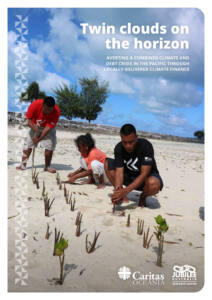
Caritas Aotearoa New Zealand is calling for more effective and transparent climate-finance channels to deliver funds and results directly to the local level in the Pacific to prioritise the poorest and most vulnerable, and not add to debt burdens.
Caritas joined six other members of the Caritas Oceania regional network to release a report on 4 October entitled: Twin clouds on the horizon: averting a combined climate and debt crisis in the Pacific through locally-delivered climate finance.
They released the report at the network’s annual forum in Port Moresby. Caritas New Zealand’s Director Mena Antonio attended with about 25 Caritas delegates from around the region.
‘Communities need to be able to directly access climate-related funds to support solutions they have identified themselves,’ Ms Antonio said. ‘Local groups and civil society also need to actively deliver, monitor and evaluate climate-finance projects. We’ve seen the value of local involvement in design and implementation for our long-term development programmes.
‘Funders need to be assured money is going to purposes intended, while local communities need to be assured climate-related projects meet their needs, can adapt to changing circumstances and provide for their future.’
The report includes the story of Manus Island (PNG) organisation Marine Environment Awareness and Response Team. It is working with communities to build traditional seawalls from stones and logs to protect against coastal flooding and to plant mangroves to prevent coastal erosion. But such organisations struggle to get necessary funding to support their work.
The report also illustrates the benefits of smaller organisations working with larger NGOs to access funds, such as Caritas Samoa partnering with US-based Catholic Relief Services, to access a USAID grant for a water project.
Twin Clouds builds on a decade of environmental monitoring across the Pacific led by Caritas Aotearoa New Zealand through the Caritas State of the Environment for Oceania series. This series has tracked climate finance trends, how local communities were experiencing and responding to extreme weather, coastal erosion and sea level rise, access to safe food and water, and mining and drilling of the ocean floor. Caritas shares these stories and community resilience and restoration efforts through ‘The Oceanian Monitor’ map and other online resources.
Caritas released the report and map ahead of this month’s United Nations climate conference – COP27 in Sharm el-Sheikh in Egypt, 7–18 November.
‘The real fight against climate change is happening at the grass roots and coastal edges, where people are protecting their lives and livelihoods as best they can,’ says Ms Antonio. ‘COP21 in Paris was a breakthrough moment in climate action. We are hoping for another breakthrough moment around COP27 to provide for the real needs of the poor.’
The report: caritas.org.nz/newsroom/climate-finance-needs-to-work-for-communities